【法律概述】法律英语术语
法律英语知识点归纳
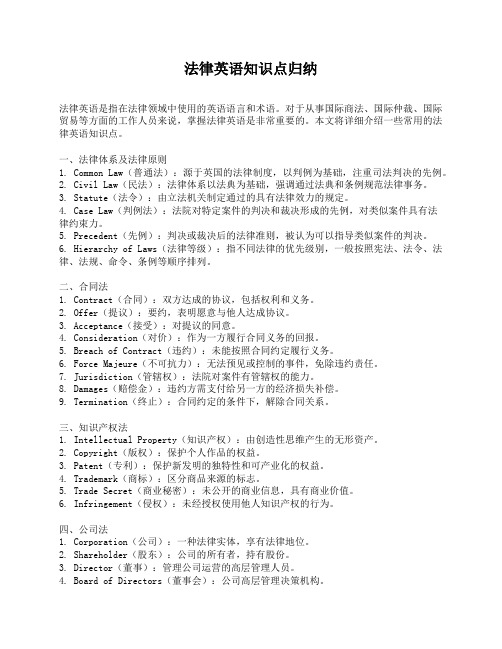
法律英语知识点归纳法律英语是指在法律领域中使用的英语语言和术语。
对于从事国际商法、国际仲裁、国际贸易等方面的工作人员来说,掌握法律英语是非常重要的。
本文将详细介绍一些常用的法律英语知识点。
一、法律体系及法律原则1. Common Law(普通法):源于英国的法律制度,以判例为基础,注重司法判决的先例。
2. Civil Law(民法):法律体系以法典为基础,强调通过法典和条例规范法律事务。
3. Statute(法令):由立法机关制定通过的具有法律效力的规定。
4. Case Law(判例法):法院对特定案件的判决和裁决形成的先例,对类似案件具有法律约束力。
5. Precedent(先例):判决或裁决后的法律准则,被认为可以指导类似案件的判决。
6. Hierarchy of Laws(法律等级):指不同法律的优先级别,一般按照宪法、法令、法律、法规、命令、条例等顺序排列。
二、合同法1. Contract(合同):双方达成的协议,包括权利和义务。
2. Offer(提议):要约,表明愿意与他人达成协议。
3. Acceptance(接受):对提议的同意。
4. Consideration(对价):作为一方履行合同义务的回报。
5. Breach of Contract(违约):未能按照合同约定履行义务。
6. Force Majeure(不可抗力):无法预见或控制的事件,免除违约责任。
7. Jurisdiction(管辖权):法院对案件有管辖权的能力。
8. Damages(赔偿金):违约方需支付给另一方的经济损失补偿。
9. Termination(终止):合同约定的条件下,解除合同关系。
三、知识产权法1. Intellectual Property(知识产权):由创造性思维产生的无形资产。
2. Copyright(版权):保护个人作品的权益。
3. Patent(专利):保护新发明的独特性和可产业化的权益。
4. Trademark(商标):区分商品来源的标志。
法律英语重点专业词汇解析
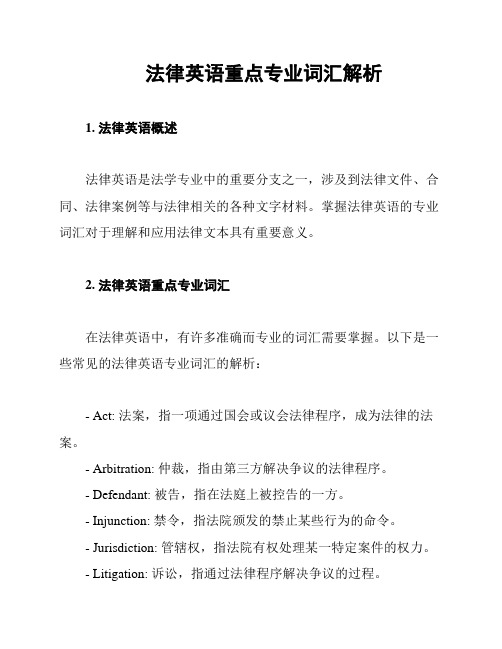
法律英语重点专业词汇解析1. 法律英语概述法律英语是法学专业中的重要分支之一,涉及到法律文件、合同、法律案例等与法律相关的各种文字材料。
掌握法律英语的专业词汇对于理解和应用法律文本具有重要意义。
2. 法律英语重点专业词汇在法律英语中,有许多准确而专业的词汇需要掌握。
以下是一些常见的法律英语专业词汇的解析:- Act: 法案,指一项通过国会或议会法律程序,成为法律的法案。
- Arbitration: 仲裁,指由第三方解决争议的法律程序。
- Defendant: 被告,指在法庭上被控告的一方。
- Injunction: 禁令,指法院颁发的禁止某些行为的命令。
- Jurisdiction: 管辖权,指法院有权处理某一特定案件的权力。
- Litigation: 诉讼,指通过法律程序解决争议的过程。
- Patent: 专利,指一项新的发明或发现的独特技术。
- Plaintiff: 原告,指在法庭上提起诉讼的一方。
- Tort: 侵权行为,指侵犯他人权益的非法行为。
- Waiver: 放弃,指明确放弃某种合法权利的行为。
3. 法律英语研究方法了解法律英语的专业词汇是研究法律英语的基础。
以下是一些研究法律英语的方法:- 积累词汇:通过背诵和记忆法律英语的专业词汇,增加词汇量和理解能力。
- 阅读法律文本:阅读法律文件、合同和案例,提高对法律英语的理解和应用能力。
- 借助工具:使用法律英语词典、翻译软件等工具,提供准确、专业的词汇解释和翻译。
4. 结论法律英语的专业词汇对于学习和理解法律文本具有至关重要的意义。
通过积累词汇、阅读法律文本以及借助工具,我们可以提高对法律英语的掌握和应用能力。
希望这篇文档能够为学习法律英语的同学们提供一些帮助。
法律常用术语分类中英对照

法律常用术语分类中英对照法律常用术语【(一)、法令】rule 条例law 法律criminal law 刑法interpret 解释(法律)the legislature 立法机构the legal system/ the judicial system/ court system 法律体系【(二)、主体】the judge 法官the lawyer 律师(总称)the jury 陪审团the juror 陪审团成员the prosecutor(刑事案件)原告人;检察官,公诉人;the plaintiff (民事案件) 原告人the injured party/victim被害人witness/eyewitness 见证人,目击者the prosecution 原告及其代理律师;代表原告的律师the accused/defendant 被告人the defense lawyer/counselor 被告辩护律师【(三)、违法】【案件种类】case 案件crime - criminal adj.a criminal case 刑事案件a civil case民事案件【行为/罪名--criminal behavior】guilt n. [Antonym] innocence guilty adj. [Antonym]innocentguilty of a crime/chargeinnocent of a crime/chargecommit a crime violate a criminal lawmurder 谋杀罪 first-degree murder (deliberately)一级谋杀罪;故意杀人罪manslaughter (not intentionally) 一般杀人罪;过失杀人罪forgery 伪造罪 sexual harassment 性骚扰malfeasance 渎职罪criminal: n. 罪犯 a convicted criminal :one who has been judged guilty in a court of law a hardened criminal :someone who has committed many crimes stab v. 用刀具行凶,捅,刺 to kill or hurt someone by pushing a knife or other sharp object into their body stab someone to death 刺死flick knife /switch blade/knife 弹簧刀mug v. =rob 抢劫 to attack someone in a public place and steal their money, jewellery, or other possessions 【(四)、程序】【逮捕】arrestpick up :to arrest someone and take them away in a car 【调查】investigationconduct a criminal investigation intocriminal proceedings :the process of examining a crime in a court of lawcross-examination 【诉讼】find someone guilty/not guilty ofsomething :officially decide that they are guilty/not guiltyto be charged with/to be accused ofto accuse sb. of certain crimecharge v. to charge sb. with certain crime be charged with (doing) sth e.g. They are the jury forthe trial of a boy charged with murdering his father.prosecute -prosecution n. to prosecute sb. for sth. face prosecution overto bring a prosecution against sb. 对…提起诉讼escape prosecutioncriminal charges :official statements saying that sb is accused by the police of committing a crime claim v. to say that someone’s actions are the cause of something 【法庭种类】a criminal court刑事法庭,e.g. The scene is a jury room in a criminal court.a civil court 民事法庭children’s court 少年法庭The Supreme Court 最高法院【监督】supervise 监督【作证】to testify v.作证 to make a statement about something you saw, know, or experienced, usually in a court of law testify for/against someone testimony 证词proofdefinite proof provide the proofpresent the proofevidence 证据,证物 to identify 鉴别flimsy adj. not very reliable flimsy evidence accurate adj. correct or true in every detail unshakable adj. 不可动摇的 self-contradiction 自相矛盾alibi n. 不在场的证据 someone who has an alibi can prove that they were somewhere else when a crime was committed and so can claim to be not guilty 【庭审】question v.questi on/suspect sb’s motive【辩护】to defend sb为…辩护to refute 反驳--refutable adj.--refutation n. 【陪审团讨论】the jury 陪审团a grand jury 大陪审团the juror 陪审团成员the jury room 陪审室discuss - discussion 讨论proposal 提议vote 投票abstain v. 弃权vote for/in favor of/againsttake a preliminary vote e.g. I think it’s customary to take a preliminary voteanalyze 分析assume v. 假定ballot n. 无记名投票to argue with 争论agreement 一致意见disagreement 反对意见a reasonable doubtto hang the jury: to make the jury unable to reach a unanimous decisiondeclare a hung juryreach a unanimous decisionbe deemed innocent/guilty 被认为无罪/有罪prove innocent/guilty 被证明无罪/有罪【审判】guilty/ not guilty(innocent)trial/ the jury trial 审判a fair trialset free / acquitted 无罪释放admit v. agree that something is true 承认plead guilty to something : say that you areguilty e.g. He pleaded guilty to all charges. 【(五)、处罚--punishment】【场所】reform school 感化院,jail/ prison n.监狱【方式】jail v. to put someone in jail to be in jailjail someone for somethinggo/ be sent to jailto serve a jail termbe executedthe executionerto pull the switchto send sb. to the chair =send someone to the electric chair /to sentence sb. to be electrocuted 电刑 to sentence sb. to death give the sentence 施刑get out of jail 【其他】have the right to do 有权 on behalf of 代表draft 法案,草案 Government bill 政府议案 to pass a bill, to carry a bill 通过议案 to enact a law, to promulgate a law 颁布法律 ratification, confirmation 批准 law enforcement 法律的实施to come into force 生效 decree 法令 clause 条款minutes 备忘录 report 判例汇编 codification 法律汇编legislation 立法 legislator 立法者 jurist 法学家jurisprudence 法学 legitimation 合法化 legality, lawfulness 法制,合法 legal, lawful 合法的,依法的 to contravene a law, to infringe a law, to break a law 违法 outlaw, outside the law 超出法律范围的 offender 罪犯 to abolish 废止,取消 rescission, annulment 废除,取消 repeal, revocation, annulment 废除(法律)cancellation, annulment, invalidation 废除(合同) cancellation (支票)作废 annulment 撤消(遗嘱) repeal rescission 撤消(判决) revocation 撤消immunity 豁免,豁免权 disability, legal incapacity 无资格 nonretroactive character 不溯既往性 prescription 剥夺公权 attainder 公民权利的剥夺和财产的没收constitutional law 宪法 canon law 教会法规 common law 习惯法 criminal law 刑法 administrative law 行政法civil law 民法 commercial law, mercantile law 商法 law of nations 万国公法,国际法 international law 国际法natural law 自然法 labour laws 劳工法 fiscal law 财政法 Civil Suit Law, Code of civil law 民事诉讼法Military Law 军法 Conscript Law 兵役法Copyright Law 著作权法 penal code 刑法典 code of mercantile law 商法典 civil rights 民事权利,公民权利right of asylum 避难权 human rights, rights of man 人权 (customs) duties 关税 death duty, death tax 遗产税royalties 版税。
(完整版)法律学专业英语
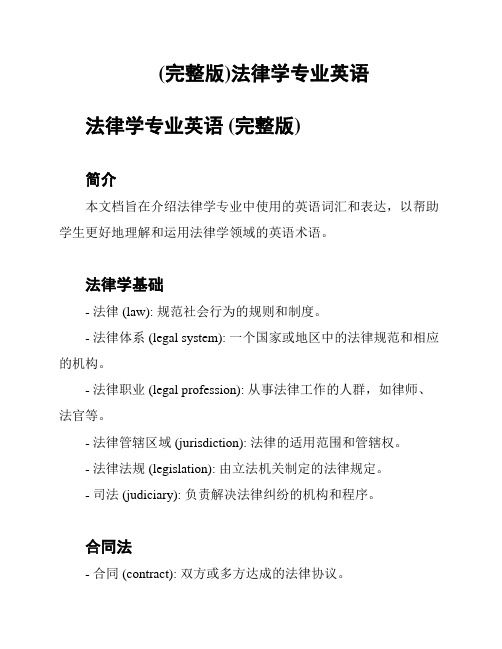
(完整版)法律学专业英语法律学专业英语 (完整版)简介本文档旨在介绍法律学专业中使用的英语词汇和表达,以帮助学生更好地理解和运用法律学领域的英语术语。
法律学基础- 法律 (law): 规范社会行为的规则和制度。
- 法律体系 (legal system): 一个国家或地区中的法律规范和相应的机构。
- 法律职业 (legal profession): 从事法律工作的人群,如律师、法官等。
- 法律管辖区域 (jurisdiction): 法律的适用范围和管辖权。
- 法律法规 (legislation): 由立法机关制定的法律规定。
- 司法 (judiciary): 负责解决法律纠纷的机构和程序。
合同法- 合同 (contract): 双方或多方达成的法律协议。
- 条款 (clause): 合同中的具体规定。
- 解除合同 (terminate a contract): 终止合同的关系。
- 违约 (breach of contract): 不履行合同中的义务。
- 诉讼 (litigation): 法律纠纷的裁决过程。
- 裁决 (judgment): 法庭对案件作出的决定。
刑法- 罪行 (crime): 违反法律规定的行为。
- 定罪 (conviction): 法庭裁定有罪。
- 刑罚 (sentence): 法庭对犯罪行为的处罚。
- 谋杀 (murder): 故意杀人的犯罪行为。
- 盗窃 (theft): 非法占有他人财产的犯罪行为。
- 贪污 (bribery): 通过行贿来获取不正当利益的犯罪行为。
市场法- 专利 (patent): 对新发明的独特权利。
- 商标 (trademark): 用于区分某个商品或服务来源的标识。
- 消费者权益 (consumer rights): 保护消费者权益的法律规定。
结束语本文档只是法律学专业英语的简要介绍,希望能为学生们提供一些基础的法律英语表达。
学生可根据具体需要进一步深入研究和了解相关内容。
法律英语重点专业词汇研究

法律英语重点专业词汇研究本文主要研究法律英语中的重点专业词汇。
在法律领域,准确理解和运用专业术语至关重要,因此掌握关键词汇对于法律专业人士至关重要。
1. 法律法规- 法律 (法律英文:law): 一国或地区制定并正式公布、由政府实施的规范人们行为的规则体系。
法律可分为刑法、民法、行政法等。
- 法规 (法律英文:regulation): 政府或其他有权机关颁布的规范性文件,具有行政强制力。
- 条款 (法律英文:article/section/clause): 法律、法规等文件中的具体规定或条目。
2. 诉讼程序和法庭相关术语- 诉讼 (法律英文:litigation): 通过法律程序解决纠纷或争议。
- 原告 (法律英文:plaintiff): 在诉讼中提起诉讼或寻求救济的一方。
- 被告 (法律英文:defendant): 在诉讼中被起诉或被控告的一方。
- 律师 (法律英文:lawyer/attorney): 具有执业资格从事法律服务的专业人士。
- 法庭 (法律英文:court): 由法官主持审理案件的地方。
3. 合同法- 合同 (法律英文:contract): 双方或多方之间为了确定权利和义务而达成的一种协议。
- 当事人 (法律英文:party): 在合同中具有权利和义务的个人或组织。
- 违约 (法律英文:breach): 违反合同规定的行为或不履行合同义务。
- 无效 (法律英文:invalid): 合同不具有法律效力或被认为无效的状态。
4. 知识产权- 版权(法律英文:copyright): 由法律保护的创作作品的独占权。
- 商标 (法律英文:trademark): 用于区分商品或服务来源的特定标识符。
- 专利 (法律英文:patent): 对发明、产品或制造方法等的独占权。
- 侵权 (法律英文:infringement): 未经授权使用他人知识产权的行为。
5. 财务法律- 税务 (法律英文:taxation): 政府根据法律规定对个人和组织征收的财务责任。
法律英语基本术语

<Chapter 1>1)actual intent / direct intent 直接故意2)Indirect intent 间接故意3)careless and inadvertent negligence 疏忽大意的过失4)negligence with undue assumption 过于自信的过失5)accident 意外事件6)self-defense 正当防卫7)act of rescue; necessity 紧急避险8)unjustifiable self-defense 防卫过当9)The testator(立遗嘱者) died without issue. 身故无后(无嗣)10)Parties must wait for process to issue from the court.11)Bar——法庭中将公众与法官、律师及其他诉讼参与人分隔开的隔板。
后来用于通指法律职业或律师职业。
12)American Bar Association 美国律师协会13)Lawyer/Attorney/Attorney –at-law/Counseler/Counseler –at-law 律师(美国)14)Barrister 诉讼律师,大律师,出庭律师(英国)15)Solicitor 非诉律师,诉状律师,事务律师(英国)16)advocate,attorney, attorney at law; attorney-at-law, bar, barrister, counsel, counselor,counselor-at-law,,esquire, gentleman of the robe, gentleman of the long robe, lawyer, solicitor……律师17)Advocate是指学习法律、依法获准执业、为当事人提供法律意见,并有资格出庭参加案件公开审理的律师,即辩护律师(在英美不常用);又指法国、英格兰等地律师、法律顾问。
常用的法律英语术语
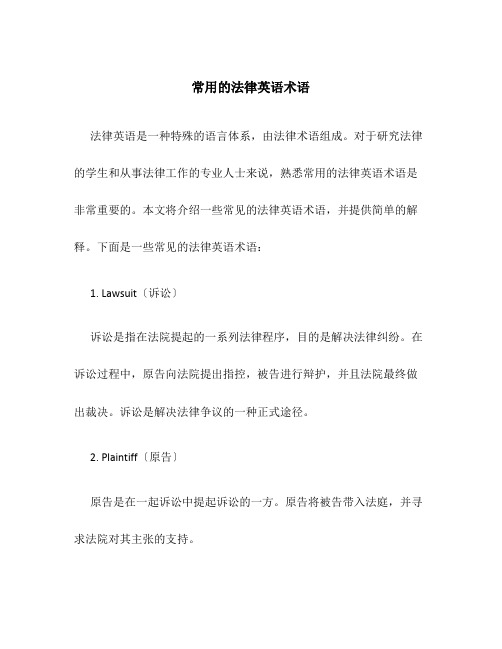
常用的法律英语术语法律英语是一种特殊的语言体系,由法律术语组成。
对于研究法律的学生和从事法律工作的专业人士来说,熟悉常用的法律英语术语是非常重要的。
本文将介绍一些常见的法律英语术语,并提供简单的解释。
下面是一些常见的法律英语术语:1. Lawsuit〔诉讼〕诉讼是指在法院提起的一系列法律程序,目的是解决法律纠纷。
在诉讼过程中,原告向法院提出指控,被告进行辩护,并且法院最终做出裁决。
诉讼是解决法律争议的一种正式途径。
2. Plaintiff〔原告〕原告是在一起诉讼中提起诉讼的一方。
原告将被告带入法庭,并寻求法院对其主张的支持。
3. Defendant〔被告〕被告是在一起诉讼中被指控的一方。
被告需要在法庭上进行辩护,并试图反驳原告提出的指控。
4. Contract〔合同〕合同是由两个或多个当事人之间达成的法律协议。
合同规定了各方的权利和义务,可以是书面或口头形式。
合同是保障当事人权益的重要法律文件。
5. Breach of Contract〔合同违约〕合同违约是指合同一方未能履行其在合同中规定的义务。
当一方未能履行合同条款时,另一方可以采取法律行动来追求赔偿或解除合同。
6. Tort〔侵权行为〕侵权行为指的是一方在未获得另一方同意的情况下,通过行为或不行为给另一方造成了伤害或损失。
常见的侵权行为包括人身伤害、财产损失等。
7. Negligence〔疏忽〕疏忽是指一方在行为上未能按照合理的标准行事,从而给他人造成伤害或损失。
在法律上,如果被告以不合理的方式行事,并因此给原告造成了损害,那么可以被认定为疏忽。
8. Crime〔犯罪〕犯罪是指违反法律的行为。
根据犯罪的严重程度,有不同的刑事罪名和相应的刑罚。
犯罪行为可能包括盗窃、谋杀、强奸等。
9. Plaintiff’s Attorney〔原告律师〕原告律师是代表原告在诉讼过程中提供法律援助的专业人士。
原告律师负责收集证据、起草法律文件,并代表原告出庭。
10. Defendant’s Attorney〔被告律师〕被告律师是代表被告在诉讼过程中提供法律援助的专业人士。
法律英语词汇:17个法律术语
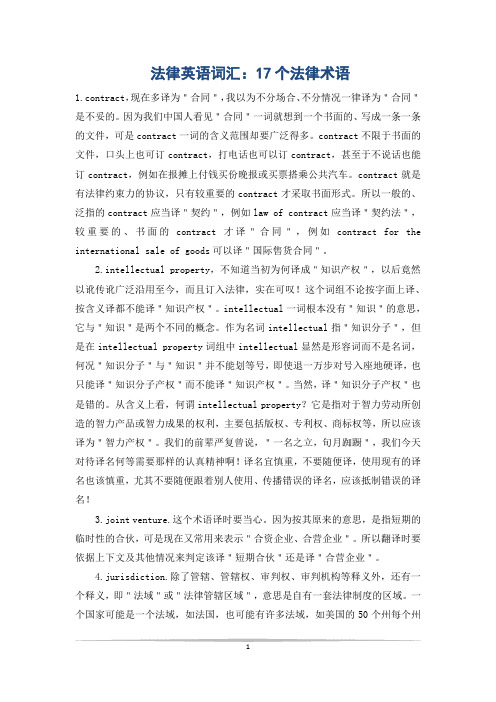
法律英语词汇:17个法律术语1.contract,现在多译为"合同",我以为不分场合、不分情况一律译为"合同"是不妥的。
因为我们中国人看见"合同"一词就想到一个书面的、写成一条一条的文件,可是contract一词的含义范围却要广泛得多。
contract不限于书面的文件,口头上也可订contract,打电话也可以订contract,甚至于不说话也能订contract,例如在报摊上付钱买份晚报或买票搭乘公共汽车。
contract就是有法律约束力的协议,只有较重要的contract才采取书面形式。
所以一般的、泛指的contract应当译"契约",例如law of contract应当译"契约法",较重要的、书面的contract才译"合同",例如contract for the international sale of goods可以译"国际售货合同"。
2.intellectual property,不知道当初为何译成"知识产权",以后竟然以讹传讹广泛沿用至今,而且订入法律,实在可叹!这个词组不论按字面上译、按含义译都不能译"知识产权"。
intellectual一词根本没有"知识"的意思,它与"知识"是两个不同的概念。
作为名词intellectual指"知识分子",但是在intellectual property词组中intellectual显然是形容词而不是名词,何况"知识分子"与"知识"并不能划等号,即使退一万步对号入座地硬译,也只能译"知识分子产权"而不能译"知识产权"。
当然,译"知识分子产权"也是错的。
从含义上看,何谓intellectual property?它是指对于智力劳动所创造的智力产品或智力成果的权利,主要包括版权、专利权、商标权等,所以应该译为"智力产权"。
我们的前辈严复曾说,"一名之立,旬月踟蹰",我们今天对待译名何等需要那样的认真精神啊!译名宜慎重,不要随便译,使用现有的译名也该慎重,尤其不要随便跟着别人使用、传播错误的译名,应该抵制错误的译名!3.joint venture.这个术语译时要当心。
- 1、下载文档前请自行甄别文档内容的完整性,平台不提供额外的编辑、内容补充、找答案等附加服务。
- 2、"仅部分预览"的文档,不可在线预览部分如存在完整性等问题,可反馈申请退款(可完整预览的文档不适用该条件!)。
- 3、如文档侵犯您的权益,请联系客服反馈,我们会尽快为您处理(人工客服工作时间:9:00-18:30)。
【法律概述】法律英语术语
Criminal law: an overview
Criminal law involves prosecution by the government of a person for an act that has been classified as a crime. Civil cases, on the other hand, involve individuals and organizations seeking to resolve legal disputes. In a criminal case the state, through a prosecutor, initiates the suit,while in a civil case the victim brings the suit. Persons convicted of a crime may be incarcerated,fined, or both. However, persons found liable in a civil case may only have to give up property or pay money, but are not incarcerated.
A “crime” is any act or omission (of an act)
in violation of a public law forbidding or commanding it. Though there are some common law crimes, most crimes in the United States are established by local,state, and federal governments. Criminal laws vary significantly from state to state. There is,
however, a Model Penal Code (MPC) which serves as a good starting place to gain an understanding of the basic structure of criminal liability.
Crimes include both felonies (more serious offenses ---- like murder or rape) and misdemeanors (less serious offenses ---- like petty theft or jaywalking)。
Felonies are usually crimes punishable by imprisonment of a year or more, while misdemeanors are crimes punishable by less than a year. However,
no act is a crime if it has not been previously established as such either by statute or common law. Recently, the list of Federal crimes, dealing with activities extending beyond state boundaries or having special impact on federal operations, has grown.
All statutes describing criminal behavior can be broken down into their various elements. Most crimes (with the exception of strict-liability crimes)consist of two elements: an act,or “actus reus,” and a mental state,or “mens rea.” Prosecutors have to prove each and every element of the crime to yield a conviction. Furthermore, the prosecutor must
persuade the jury or judge “beyond a reasonable doubt” of every fact necessary to constitute the crime charged. In civil cases, the plaintiff needs to show a defendant is liable only by a “preponderance of the evidence,” or more than 50%.。
